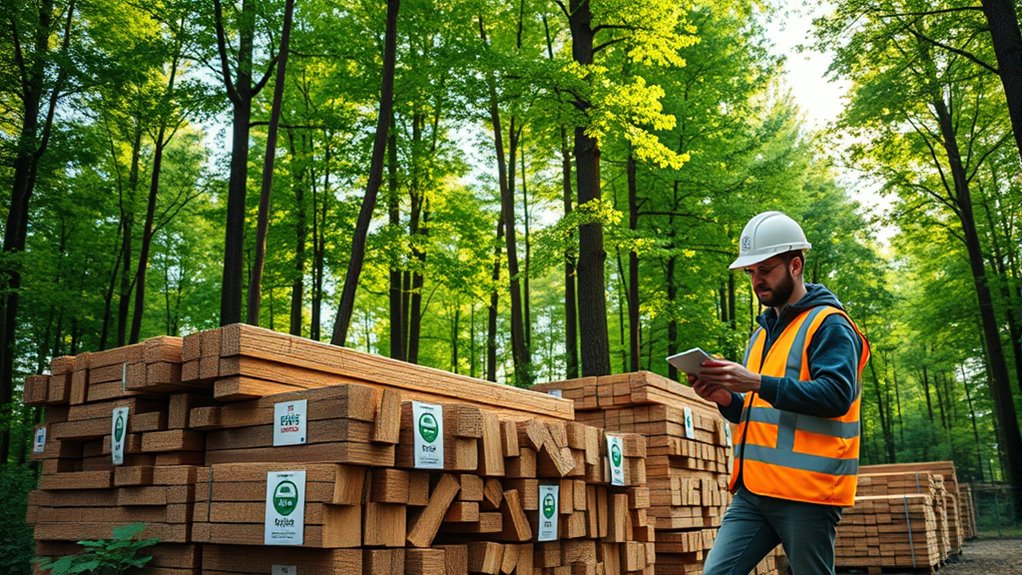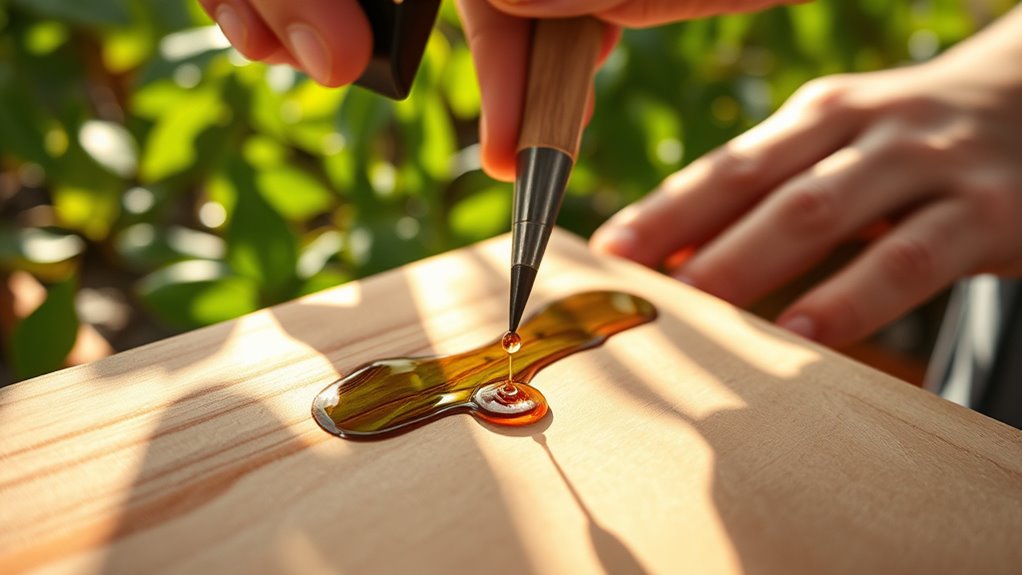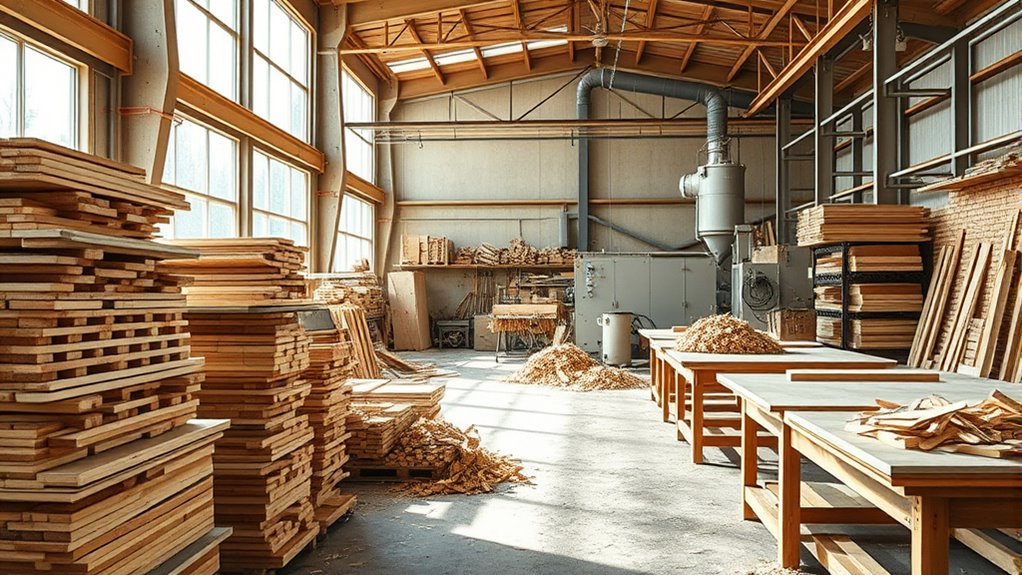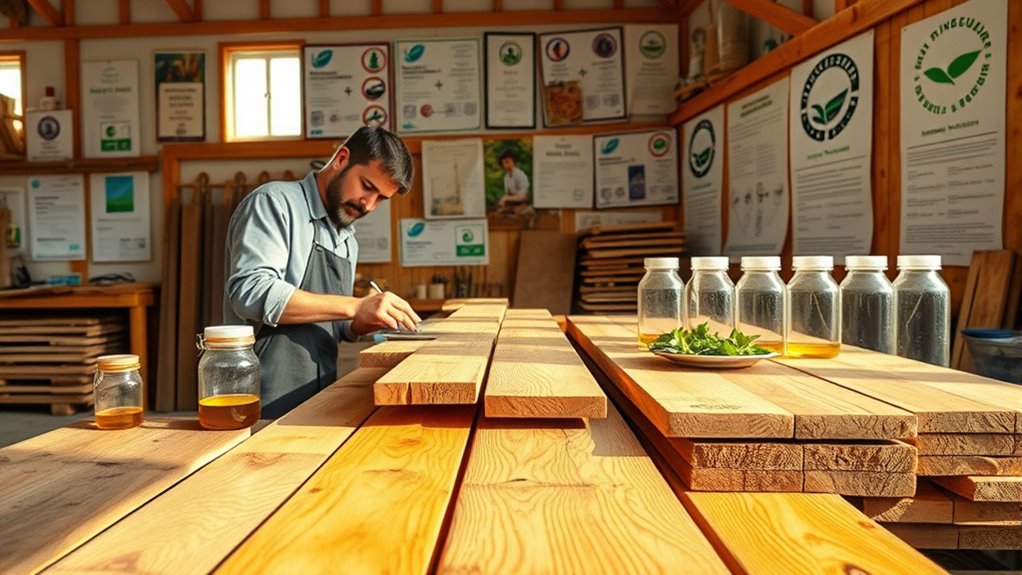WoodnBits guarantees eco-friendly production by sourcing only from FSC- and PEFC-certified forests, guaranteeing sustainable harvesting. They use low-impact manufacturing techniques, optimize material use, and recycle waste into pellets or compost. Their finishes are natural and non-toxic, supporting healthier indoor environments. They also conserve water and energy through recycling systems and renewable solutions. Committed to transparency and certifications, they foster trust and demonstrate leadership in sustainability. To discover more about their eco-conscious practices, keep exploring their approach.
Key Takeaways
- WoodnBits sources raw materials exclusively from FSC- and PEFC-certified forests, ensuring sustainable and traceable sourcing practices.
- The company employs energy-efficient machinery, renewable energy, and water recycling techniques to minimize environmental impact.
- Eco-friendly finishes, such as natural oils and low-VOC treatments, are used to reduce chemical emissions and support product lifecycle sustainability.
- Waste materials like sawdust and offcuts are repurposed into wood pellets, compost, or bioenergy, supporting circular economy principles.
- Transparency through documentation and eco-labeling ensures consumers are informed about WoodnBits’ sustainable production practices.

Natural Earth Paint Natural Varnish – 100% Eco-Friendly, Non-Toxic Protective Finish for Paintings, Wood & Crafts – Fast-Drying, Glossy & Durable – 4 oz. Made in USA
Formula: Our varnish is made from food-grade ingredients, including grain alcohol, natural resins, oils, and other all-natural ingredients,…
As an affiliate, we earn on qualifying purchases.
As an affiliate, we earn on qualifying purchases.
Sourcing From Certified and Responsible Forests

Since responsible sourcing is fundamental to eco-friendly production, WoodnBits guarantees all raw materials come exclusively from FSC- and PEFC-certified forests. This ensures your products originate from certified forests practicing sustainable forestry and proper forest management. By sourcing from these forests, you support responsible sourcing that emphasizes replanting, biodiversity, and ecological health. Each batch of wood is traceable back to sustainably managed forests, providing transparency in your supply chain. WoodnBits collaborates with suppliers committed to strict harvesting practices, reducing ecological impact. Prioritizing regions with verified environmental standards, they help protect natural habitats and promote forest regeneration. Traceability systems further enhance transparency, allowing you to verify the sustainability of each product. Implementing certified forest management practices ensures ongoing ecological balance and resource renewal. Additionally, rigorous monitoring and certification programs guarantee adherence to environmental standards throughout the supply chain. This approach demonstrates your commitment to sustainability and responsible forest management, with sustainable forestry practices playing a key role in minimizing ecological impact. Incorporating sustainable harvesting methods helps maintain forest health and productivity over the long term. Ensuring your supply chain aligns with these standards helps contribute positively to conservation efforts while maintaining high-quality standards.

Amazon Basics FSC Certified Sturdy Solid Wood Rectangular Dining Table, Easy Assembly, Kitchen Table, 29.5"D x 47.2"W x 29.5"H, Natural Wood
FSC-CERTIFIED Tables (FSC N004130): Made with materials from well-managed forests, recycled materials, and/or other controlled wood sources
As an affiliate, we earn on qualifying purchases.
As an affiliate, we earn on qualifying purchases.
Utilizing Sustainable and Low-Impact Manufacturing Techniques

To reduce environmental impact, WoodnBits employs sustainable and low-impact manufacturing techniques that prioritize efficiency and resource conservation. You’ll find that our sustainable manufacturing includes energy-efficient machinery and processes that cut electricity use. We also adopt low-impact processes, carefully managing water and chemical use to prevent contamination, following strict eco-friendly practices. To minimize waste, we repurpose sawdust and offcuts into wood pellets or compost, supporting waste reduction. Our responsibly sourced materials come from forests with FSC or PEFC certifications, ensuring sustainable harvesting. Additionally, we design products with circular economy principles, emphasizing durability, repairability, and recyclability. Implementing eco-friendly practices throughout our production process helps us further reduce our carbon footprint and promote environmental stewardship. We also incorporate renewable energy solutions to power our operations, further decreasing reliance on non-renewable resources. We continuously monitor and improve our methods to stay aligned with sustainable sourcing, reducing our reliance on finite resources and supporting responsible forestry management. Incorporating environmental management into every step, WoodnBits ensures that our manufacturing methods are both eco-friendly and aligned with our commitment to sustainability.

SEAL-ONCE MARINE – 1 Gallon Penetrating Wood Sealer, Waterproofer & Stain. Water-Based, Ultra-low VOC formula for high-moisture areas to protect wood docks, decks, piers & retaining walls.
MARINE SEALANT: Our liquid formula creates a UV-stable coating for protection against the elements, saltwater spray, and water…
As an affiliate, we earn on qualifying purchases.
As an affiliate, we earn on qualifying purchases.
Incorporating Eco-Friendly Finishes and Treatments

Incorporating eco-friendly finishes and treatments is a key part of WoodnBits’ commitment to sustainability, guaranteeing that your furniture not only looks beautiful but also remains safe for your family and the environment. You benefit from: 1. Natural oils and waxes that highlight wood grain while avoiding harsh chemicals. 2. Low-VOC and non-toxic treatments that reduce indoor air pollution and environmental impact. 3. Finishes designed to be biodegradable or recyclable, supporting product lifecycle sustainability. Additionally, these treatments often incorporate antioxidant-rich ingredients that protect the wood from environmental damage and extend the lifespan of your furniture. These sustainable treatments enhance durability without relying on harmful solvents or paints. Furthermore, the use of eco-conscious manufacturing practices minimizes waste and energy consumption during production, emphasizing WoodnBits’s dedication to reducing its ecological footprint. Incorporating sustainable material sourcing ensures that raw materials are responsibly obtained, further supporting environmental conservation. A comprehensive quality assurance process guarantees that each finish meets strict environmental standards and provides consistent performance. WoodnBits’s eco-friendly finishes are specially formulated to be environmentally conscious, minimizing waste and energy use in production. This approach ensures your furniture is both beautiful and responsible, aligning with your eco-values.

Hardwood Oak Heating Pellets
Made in the USA from 100% kiln-dried oak fiber
As an affiliate, we earn on qualifying purchases.
As an affiliate, we earn on qualifying purchases.
Reducing Waste Through Efficient Cutting and Recycling Processes

By implementing precise cutting techniques, WoodnBits guarantees maximum material utilization and considerably reduces waste. These manufacturing processes minimize offcuts and make the most of every piece of wood, supporting waste reduction. The company also recycles wood scraps by turning them into products like wood pellets and packing materials, keeping materials in use and promoting a circular economy. Excess sawdust and shavings aren’t discarded; instead, they’re transformed into bioenergy, contributing to renewable energy sources. Additionally, wastewater from manufacturing is treated and reused, conserving water resources and reducing environmental impact. Proper storage of materials, such as freshly cut wood, also helps maintain quality and reduces spoilage. Implementing sustainable storage practices further enhances the company’s commitment to eco-friendly production. These strategies collectively demonstrate how efficient cutting and recycling processes help WoodnBits produce eco-friendly products while reducing waste, aligning with sustainable principles and fostering responsible resource management.
Managing Water and Energy Use for Environmental Conservation

You can actively reduce your environmental impact by implementing water recycling systems that cut freshwater use considerably. Using energy-efficient machinery and renewable energy sources like solar panels further decreases overall energy consumption. Regular monitoring ensures your processes stay sustainable, minimizing waste and protecting local ecosystems. Incorporating sustainable manufacturing practices can also help promote your eco-friendly initiatives to attract environmentally conscious consumers.
Water Recycling Systems
Water recycling systems play a crucial role in reducing a company’s environmental footprint by reusing process water and minimizing freshwater intake. At WoodnBits, advanced water recycling techniques treat and reuse water, supporting eco-friendly production. These systems feature:
- Filtration and eco-friendly water treatment methods that purify water and prevent pollutants from entering local water bodies. They often employ sustainable water treatment technologies that reduce chemical use and energy consumption. Incorporating energy-efficient processes further optimizes water reuse and minimizes resource consumption.
- Closed-loop water systems that cut down wastewater discharge and conserve natural resources.
- Continuous monitoring to guarantee maximum water reuse efficiency, reducing energy use associated with water heating and treatment. Water conservation practices are integrated into the system design to further enhance sustainability efforts.
- Incorporating environmentally sustainable practices ensures that water conservation efforts align with broader ecological goals. Additionally, implementing innovative filtration techniques can further improve water quality and system efficiency.
Energy-Efficient Machinery
Implementing energy-efficient machinery is essential for reducing environmental impact and optimizing resource use. At WoodnBits, we utilize state-of-the-art equipment that cuts electricity consumption by up to 30%, supporting sustainable manufacturing. Regular maintenance and upgrades ensure our machinery runs at peak efficiency, further lowering energy use and emissions. Our eco-friendly practices include automated processes that enable precise resource management, minimizing waste and conserving energy. By adopting these advanced systems, we not only decrease greenhouse gases but also improve overall resource management, aligning production with our environmental goals. This focus on energy-efficient machinery helps us maintain high-quality products while actively reducing our ecological footprint, making eco-friendly production a core part of our commitment to sustainability. Utilizing energy-efficient machinery also helps us meet industry standards for sustainability and demonstrates our dedication to environmentally responsible manufacturing.
Sustainable Resource Management
Building on our focus on energy-efficient machinery, WoodnBits emphasizes sustainable resource management by actively conserving water and energy throughout manufacturing. We utilize water recycling systems to reduce freshwater use and prevent local water contamination. Our approach includes:
- Implementing strict water and energy management protocols, regularly monitoring to eliminate waste.
- Using renewable energy sources, like solar panels, to lower overall energy consumption.
- Embracing circular economy practices by reusing wastewater and repurposing scrap materials to minimize environmental impact.
These strategies ensure responsible resource utilization, supporting long-term environmental conservation. Through sustainable resource management, WoodnBits not only reduces its ecological footprint but also promotes efficiency and resilience in our production processes.
Supporting Local Economies With U.S.-Based Materials and Partnerships

By choosing U.S.-based materials, you support local artisans and small businesses, strengthening regional economies. Partnering with domestic suppliers reduces transportation emissions and promotes sustainable forestry practices. This approach helps create durable products while fostering community growth and environmental responsibility.
U.S. Material Sourcing
Choosing U.S.-based materials for eco-friendly production helps support local economies and reduce environmental impact. By sourcing U.S.-sourced materials, you benefit from:
- Ensuring responsible forestry and adherence to sustainable forestry practices, which protect natural resources.
- Supporting local supply chains that promote economic growth within American communities and improve quality control.
- Decreasing the environmental impact by lowering transportation emissions, as hardwoods are harvested closer to production sites.
Partnering with domestic artisans and small-scale producers guarantees responsible sourcing and fosters community development. This approach not only maintains high standards for responsible forestry but also minimizes the carbon footprint associated with long-distance shipping. U.S. material sourcing aligns with our commitment to eco-friendly, sustainable practices that benefit both the environment and local economies.
Supporting Local Artisans
Supporting local artisans plays a vital role in strengthening regional economies and maintaining high standards of craftsmanship. By partnering with local artisans and small-scale producers, you help foster community development and promote sustainable practices. Using U.S.-based materials means you support regional forestry, encouraging responsible sourcing and conservation. This focus on local artisans guarantees faster turnaround times, reducing the environmental impact of transportation and supporting a more sustainable supply chain. It also allows you to preserve and celebrate regional craftsmanship, delivering high-quality products with a smaller ecological footprint. Your commitment to U.S. materials and partnerships strengthens domestic supply chains, promotes responsible manufacturing, and helps build resilient communities. Supporting local artisans isn’t just about craftsmanship; it’s about making a positive environmental and social impact through responsible sourcing.
Implementing Circular Economy Principles in Production

Implementing circular economy principles in production involves designing processes and products that maximize resource efficiency and minimize waste. At WoodnBits, you focus on waste reduction by reusing discarded wood scraps for heating, drying, or small products, reducing landfill contributions. You also promote resource efficiency through repurposing sawdust and offcuts into eco-friendly products like wood pellets. To support sustainable materials, your designs emphasize durability, ensuring long-lasting items that decrease replacement needs. Additionally, your production processes are optimized to recover and reuse materials continually, closing the loop within your manufacturing cycle. By integrating these strategies, you align your operations with eco-friendly production practices, reducing environmental impact and fostering a circular economy that values waste as a resource rather than refuse.
Monitoring and Improving Environmental Performance

Building on your efforts to integrate circular economy principles, monitoring and enhancing environmental performance guarantees your production remains sustainable over time. You actively track energy consumption, waste levels, and emissions through continuous monitoring systems, providing real-time insights. Regular audits and performance assessments identify areas for improvement, helping you stay compliant with sustainability standards. Using data analytics, you optimize resource use, cut waste, and reduce environmental impact. Feedback loops from performance data guide process adjustments, fostering ongoing improvements. By adopting eco-friendly technologies and machinery aligned with the latest energy efficiency and emission regulations, you strengthen your commitment to sustainability. This proactive approach to monitoring and continuous improvement keeps your operations environmentally responsible, efficient, and aligned with your eco-friendly goals.
Promoting Transparency and Certification for Sustainable Practices

To demonstrate your commitment to sustainable practices, promoting transparency and certification is essential. You can do this by:
- Sharing detailed information about your sourcing, manufacturing, and environmental impact metrics, ensuring transparency.
- Using certified raw materials verified by reputable standards like FSC and PEFC, demonstrating responsible sourcing.
- Participating in third-party audits and collaborating with certification bodies to uphold eco-friendly and sustainable practices.
These steps confirm your dedication to responsible production, giving consumers confidence in your products. Clear documentation and labeling help customers make informed, eco-conscious choices, reinforcing your company’s reputation. By actively promoting transparency and securing certifications, you show your leadership in sustainable practices while maintaining accountability and trust.
Frequently Asked Questions
How Is Wood Environmentally Friendly?
You might wonder how wood can be environmentally friendly. Well, WoodnBits sources all its wood from certified forests, ensuring responsible harvesting. They use energy-efficient machinery and recycle materials to cut waste and energy use. Plus, they choose natural oils and safe finishes instead of harsh chemicals. By sourcing locally, they reduce transportation emissions. All these steps help you enjoy beautiful, eco-conscious products that support a healthier planet.
How Can Woodworkers Reduce Their Environmental Footprint?
Imagine your craft as a ripple—your choices impact the environment far beyond your workshop. You can reduce your footprint by sourcing FSC or PEFC certified materials, using natural oils and low-VOC paints, and optimizing energy-efficient machinery. Recycling waste like sawdust and designing for durability also make a difference. Embrace circular economy principles by reusing reclaimed wood, turning your craftsmanship into a sustainable legacy that nurtures the planet.
Is Wooden Furniture Eco-Friendly?
Wooden furniture can be eco-friendly if made responsibly. You choose pieces crafted from sustainably sourced, certified wood, like WoodnBits does. These products use eco-friendly finishes and are built to last, reducing waste and the need for frequent replacements. By supporting local artisans and prioritizing craftsmanship, you help minimize transportation emissions and promote sustainable forestry, making your furniture choice an eco-conscious decision.
How Eco-Friendly Are Eco Friendly Products?
You might wonder how eco-friendly these products really are. The truth is, they’re designed to minimize environmental impact through sustainable sourcing, energy-efficient manufacturing, and natural, non-toxic finishes. By choosing products made with FSC and PEFC certified materials, you support responsible forestry. Plus, local sourcing and waste reduction efforts further cut down emissions, making these products a genuinely green choice that benefits both your home and the planet.
Conclusion
By choosing Woodnbits, you’re supporting a journey toward true sustainability. Every step, from responsible sourcing to innovative recycling, reveals a commitment to the environment that’s hard to ignore. But the story doesn’t end here. As they continue to evolve and push boundaries, one question remains: how much more can they do to protect our planet while delivering quality? Stay tuned—Woodnbits is just getting started on a greener future.









